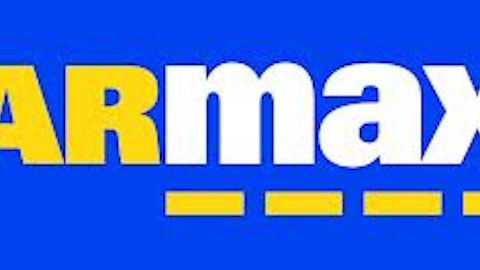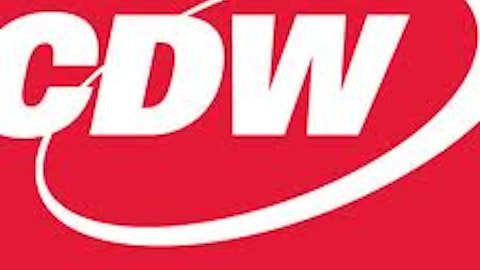If you are looking for the best ideas for your portfolio you may want to consider some of Wedgewood Partners top stock picks. Wedgewood Partners, an investment management firm, is bullish on CDW Corp (NASDAQ:CDW) stock. In its Q3 2019 investor letter – you can download a copy here – the firm discussed its investment thesis on CDW Corp (NASDAQ:CDW) stock. CDW Corp (NASDAQ:CDW) is a technology company.
In October 2019, Wedgewood Partners had released its Q3 2019 investor letter. The investment firm bought CDW Corp (NASDAQ:CDW) stock in Q3 2019. The stock has posted a return of -3.3% in the trailing one year period, underperforming the S&P 500 Index which returned 14.4% in the same period. This suggests that the investment firm was wrong in its decision.
Wedgewood Partners fund posted a return of 0.39% in the third quarter of 2019, underperforming the S&P 500 Index which returned 1.87% in the same quarter. Let’s take a look at comments made by Wedgewood Partners about CDW Corp (NASDAQ:CDW) in the Q3 2019 investor letter.
“As our clients know, we try to find ways to invest in best-of-breed businesses at attractive valuations. Particularly in many areas of technology, we struggle with this. It is easy enough to find rapidly growing companies that are not viable, cash-flow-positive, self-funding businesses; alternatively, there are many legitimate businesses trading at valuations we find unreasonable and lacking any consideration of the risks involved.
In its most basic form, we would call our new holding, CDW, a participant in and enabler of many of the fastest-growing areas of technology, but with a uniquely profitable and sustainable business model at an attractive valuation. CDW was originally incorporated in 1984 as MPK Computing. The Company later became Computer Discount Warehouse and then simply CDW.
Notionally, clients may think of CDW as fulfilling a similar role in the portfolio that Cognizant Technology Solutions had fulfilled for many years, before they lost their way a bit in more recent times. Whereas Cognizant has struggled to redefine their business strategy as they moved from their rapid growth phase to a more mature phase, and while they have struggled to balance growth and profitability as the industry has shifted toward a more digital/virtual model, CDW has seamlessly adapted their model to drive both solid revenue growth and very high returns on capital.
CDW is officially called a “value-added reseller.” Like Cognizant, they are in the supply chain between technology providers (hardware, software, cloud, etc.) and the businesses that are these providers’ end customers. We generally like the idea of being in this tech supply chain for a variety of reasons: participating in attractive industry growth; the lack of reliance on a single technology or technology vendor, which lessens obsolescence or disruption risk; and the ability to invest in a viable, significant money-making business at a much more attractive valuation than we could find on many of the vendors (some of whom are unprofitable themselves) with whom these supply chain businesses work.
This supply chain ecosystem features companies from pure-play tech distributors, like TechData, at one end of the spectrum, to companies much closer to pure-play consulting/service providers such as Accenture or Cognizant. We do not believe that either end of the spectrum is inherently “better” than the other; the business models and value propositions are just much different – and we evaluate any of these companies on their abilities to grow their businesses at attractive returns.
The primary differences between CDW and Cognizant, for clients who were familiar with Cognizant, are as follows:
• CDW functions as a sales force, distributor, and solutions provider for technology, helping primarily small and medium-sized businesses design solutions for their technology needs and then fulfilling those solutions through a large stable of vendors.
- Their value to tech vendors: outsourced sales force, outsourced DC/warehouse/fulfillment, the ability to design individual vendors’ products into solutions spread across multiple product categories and vendors
- Their value to tech customers: solution design across multiple product categories and vendors, product availability, installation and integration with existing technology
- The Company has outgrown many of their peers over the last several years by focusing on hiring engineers and specialists focused on creating solutions for its customers, rather than focusing on salespeople. This has allowed them to tap into booming areas of tech such as helping smaller organizations plan their cloud and digital workplace transitions.
• Cognizant participated in solution design, as well, and talked up their abilities in that area, but their primary value proposition in implementing these solutions was what we think of as “bodies on the ground,” or outsourced labor for software design, implementation, and integration, and this labor often was provided from a lower-cost location (i.e. India).
- Cognizant’s value proposition required a much heavier investment in office space (property, plant, and equipment, along with operating leases) than seen at peers, as they required space to recruit and train the massive influx of employees required to execute their business model; however, over time, they began to struggle to offset this heavier investment with higher growth and better margins, as they had in the past.
- Cognizant’s competitive advantage also became blunted over time as technology solutions moved off-premise, meaning that the ability to put bodies on the ground became less important.
CDW, as a hybrid between pure distribution and pure consulting/service/implementation providers, has aspects of both. As distribution is a significant component of its business, turns on their assets (both “building” assets in plant and leases, and net working capital assets) drive a significant component of their returns on investment. However, as they also have concentrated on building out their solution design and integration capabilities, they have been able to capture more growth (with smaller businesses in particular) and to improve their margins, as they have moved toward more value-added services. We note that the Company has been able to deliver a significant improvement in its returns since IPO six years ago through improving both the margin and asset turn sides of the equation.
We should note that we also have monitored Accenture, a more direct peer of Cognizant, for many years, and we find that business attractive, too. However, we struggle to fit Accenture into our criteria for growth, as they have not been a regular double-digit grower in revenues, earnings, or cash flows. In CDW, we get slightly better organic growth, firmly in the doubledigit range we need for our growth criteria; returns are attractive if not quite as attractive as Accenture’s returns, but unlike Accenture’s stable returns, returns have been steadily improving at CDW. We also get CDW at a more attractive valuation, both on an absolute basis and in relation to their growth rates.
In summary, CDW gets us exposure to many attractive technology sectors, although we would not expect this company to grow anywhere near the pace of some of the fastestgrowing technology vendors. Offsetting this, we have a much more reasonable valuation, a very steady and attractive business model delivering +20% ROIs (and significantly higher than that on an operating basis, excluding acquisitions), and no risk from any particular technology provider’s possible obsolescence or share loss. This does not signal, of course, that we have no appetite for participating in individual tech providers’ equities, as you can see from our exposure to such companies in our portfolio. This is just another way to gain attractive exposure to an attractive industry.”

NakoPhotography/Shutterstock.com
In Q2 2020, the number of bullish hedge fund positions on CDW Corp (NASDAQ:CDW) stock increased by about 11% from the previous quarter (see the chart here), so a number of other hedge fund managers believe in CDW’s growth potential. Our calculations showed that CDW Corp (NASDAQ:CDW) isn’t ranked among the 30 most popular stocks among hedge funds.
The top 10 stocks among hedge funds returned 216% since the end of 2014 and outperformed the S&P 500 Index ETFs by more than 121 percentage points. We know it sounds unbelievable. You have been dismissing our articles about top hedge fund stocks mostly because you were fed biased information by other media outlets about hedge funds’ poor performance. You could have doubled the size of your nest egg by investing in the top hedge fund stocks instead of dumb S&P 500 ETFs. Below you can watch our video about the top 5 hedge fund stocks right now. All of these stocks had positive returns in 2020.
Video: Top 5 Stocks Among Hedge Funds
At Insider Monkey we leave no stone unturned when looking for the next great investment idea. For example, we believe electric vehicles and energy storage are set to become giant markets. Tesla’s stock price skyrocketed, yet lithium prices are still below their 2019 highs. So, we are checking out this lithium stock right now. We go through lists like the 10 most profitable companies in the world to pick the best large-cap stocks to buy. Even though we recommend positions in only a tiny fraction of the companies we analyze, we check out as many stocks as we can. We read hedge fund investor letters and listen to stock pitches at hedge fund conferences. You can subscribe to our free daily newsletter on our website:
Disclosure: None. This article is originally published at Insider Monkey.




